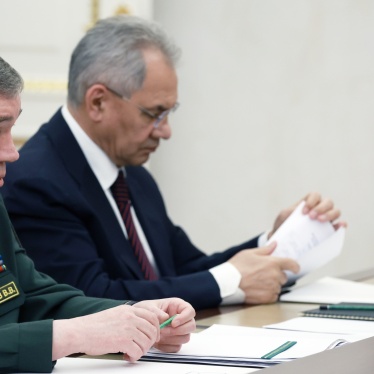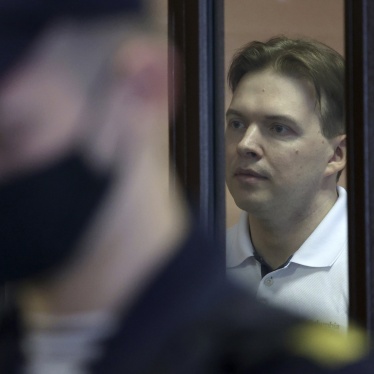(Moscow, December 21, 2011) – The Kyrgyz Supreme Court has failed to deliver justice by upholding a guilty verdict in a murder case tied to the 2010 ethnic violence that was marred by torture, violence, and threats, Human Rights Watch said today.
The Kyrgyz Supreme Court handed down its ruling on December 20, 2011, after hearing the case throughout the year. The Court upheld the verdict against eight ethnic Uzbeks, including a well known human rights defender, who were found guilty of involvement in the gruesome killing of a policeman and injuring several officers during mass disturbances in the southern city of Bazar-Kurgan in June 2010. The court left unchanged the sentences of seven of the defendants, including life sentences for five of them. It reduced the sentence of one defendant from 20 years to 11.
“The Kyrgyz justice system has utterly failed these people,” said Rachel Denber, deputy Europe and Central Asia director at Human Rights Watch. “This case was riddled with blatant flaws from start to finish, and it is astounding that the court didn’t order a thorough investigation into the way it was conducted.”
All eight defendants were found guilty in September 2010 of hostage-taking, inciting ethnic hatred, participation and organization of mass disorder, and complicity in murder.
The defendants have alleged that they were tortured in custody, and their trial, which Human Rights Watch observed, was marred by threats and violence against them by relatives of the murder victim.
The Supreme Court should have sent the case back for re-trial and instructed the prosecutorial authorities to investigate all allegations of torture, ill-treatment, and other violations of Kyrgyz and international law in this case. Human Rights Watch said.
Azimjan Askarov, a human rights defender from southern Kyrgyzstan who has worked extensively on documenting prison conditions and police treatment of detainees, is one of the defendants alleging that he was tortured. Police in Bazar-Kurgan arrested Askarov on June 15, 2010, and brought him to a police station, where he was kept in the custody of colleagues of the police officer whom he was accused of killing.
In a video interview posted on the news website Ferghana.ru in December 2010, Askarov recounted in detail what happened to him there:
“They beat me continually for three days. In the investigator’s office two police-officers stood next to me and demanded: ‘If you don’t want to write about weapons, then you will say that you were on the bridge [where the murder took place].’ Every time I refused they beat me on my kidneys from both sides at the same time. [It felt like] my lungs would jump out.”
In the video Askarov also stated that police officers came into his cell at night and threatened that they would “deal with him” if he failed to withdraw a complaint he had filed with Kyrgyzstan’s ombudsman about the beating and a request for a medical examination. As a result of these threats, Askarov withdrew the complaint.
Askarov said he was not able to consult properly with his lawyer in private for more than a month when he was held at the Bazar-Kurgan police station. On three occasions in the two months after Askarov’s arrest, angry groups who allegedly included relatives of the police officer who was killed threatened and physically attacked Askarov’s lawyer. On other occasions police insisted on being present during Askarov’s meetings with his lawyer.
Askarov repeated his allegations that he had been severely beaten to Human Rights Watch during a meeting in a Bishkek prison in December.
Threats, violence, and beatings continued after the initial period as well. During the September trial, victims’ relatives insulted, threatened, and shouted at the defense lawyers and the defendants while the court was in session. The relatives also physically attacked the defense lawyers and defendants both inside and outside the courtroom. Police officers standing nearby did not intervene.
After an appeals hearing in November, the defendants were apparently attacked in the courtroom, either by police officers or relatives of the officer who was killed, in the courtroom after their lawyers had been asked to leave.
Despite repeated complaints of mistreatment, including those raised by Human Rights Watch, Kyrgyzstan’s prosecutorial authorities have refused to open a criminal investigation into the allegations, sometimes referring to a lack of complaints from the detainees themselves.






